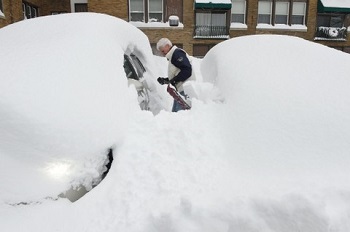How to Protect Yourself from Heart-Stopping Cold Snow

Dave White clears snow from his vehicle in Oswego Dec. 27 after more than three feet of snow fell.(Lauren Long)
SYRACUSE, N.Y. -- Because frigid temperatures and snow often set the stage for heart attack and sudden cardiac deaths, the American Heart Association is warning Central New Yorkers to be careful when outdoors in cold weather.
People at highest risk are those with heart disease, high blood pressure, high cholesterol, smokers as well as those who are overweight and sedentary, according to the association.
A heart attack is when blood flow to the heart is blocked. Sudden cardiac arrest is when the heart malfunctions and suddenly stops beating.
The association offers these tips to prevent or respond to weather-related heart problems:
Avoid sudden cold weather exertion: Snow shoveling can be a healthy exercise unless you are sedentary, in poor physical condition or have risk factors that make snow shoveling inadvisable. Everyone who must be outdoors in cold weather should avoid sudden exertion, like lifting a heavy shovel of snow. Even walking through heavy, wet snow or snowdrifts can strain a person's heart.
Recognize hypothermia: Hypothermia occurs when the body can't produce enough energy to keep internal body temperature warm enough, causing it to fall below normal. It can cause heart failure and death. Symptoms include lack of coordination, mental confusion, slowed reactions, shivering and sleepiness. Children, the elderly and those with heart disease are at highest risk. Elderly people can suffer hypotheramia without knowing it if they are insensitive to moderately cold conditions.
Stay warm: Wear layers of clothing. This traps air between layers, forming a protective insulation. Also wear a hat or headscarf. Much of the body's heat can be lost through the head. Ears are prone to frostbite. Keep hands and feet warm, too, because they tend to lose heat rapidly.
Avoid alcohol before going outdoors: Alcohol creates an initial feeling of warmth caused by expanding blood vessels in the skin. Heat is then drawn away from the body's vital organs. Alcohol consumption and physical activity in harsh winter weather can increase the likelihood of hypothermia.
Learn CPR: About 80 percent of all out-of-hospital cardiac arrests occur in private homes, so knowing cardiopulmonary resuscitation can make the difference between life and death. Effective bystander CPR provided immediately after cardiac arrest can double a victim's chance of survival. Hands-only CPR, without mouth-to-mouth breaths, is recommended for use on an adult who suddenly collapses in a non-hospital setting. Call 911, then provide 100 to 120 chest compressions per minute by pushing hard and fast in the center of the chest with minimal interruptions.
Story Credit: http://www.newyorkupstate.com/news/2018/01/how_to_protect_yourself_from_heart-stopping_cold_snow.html


